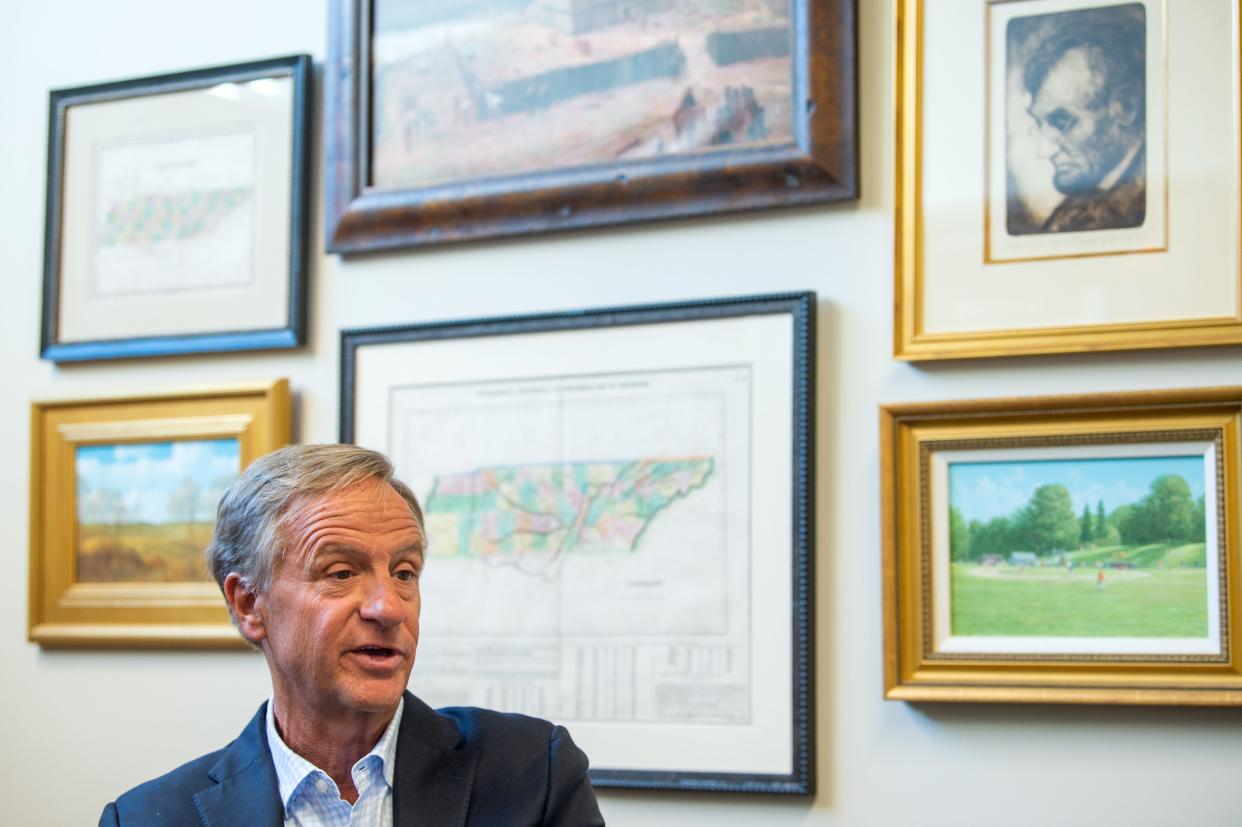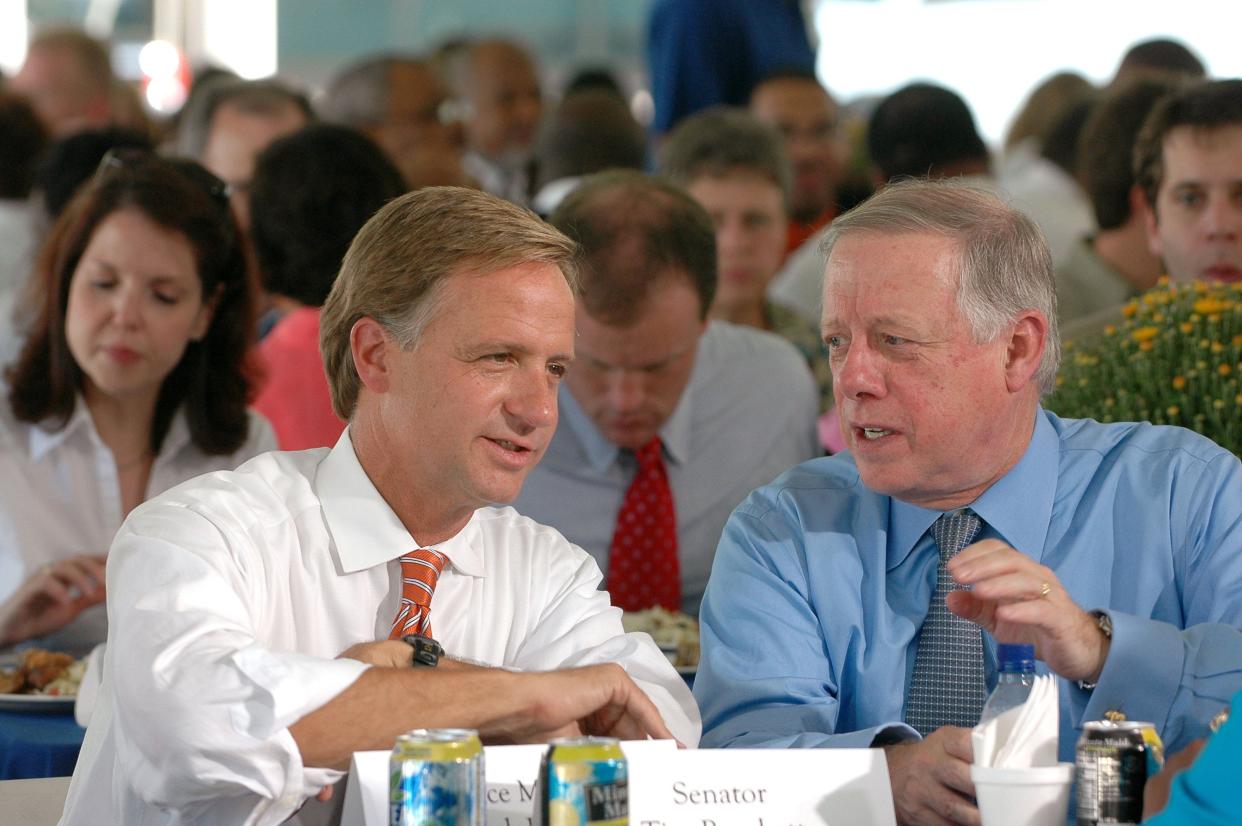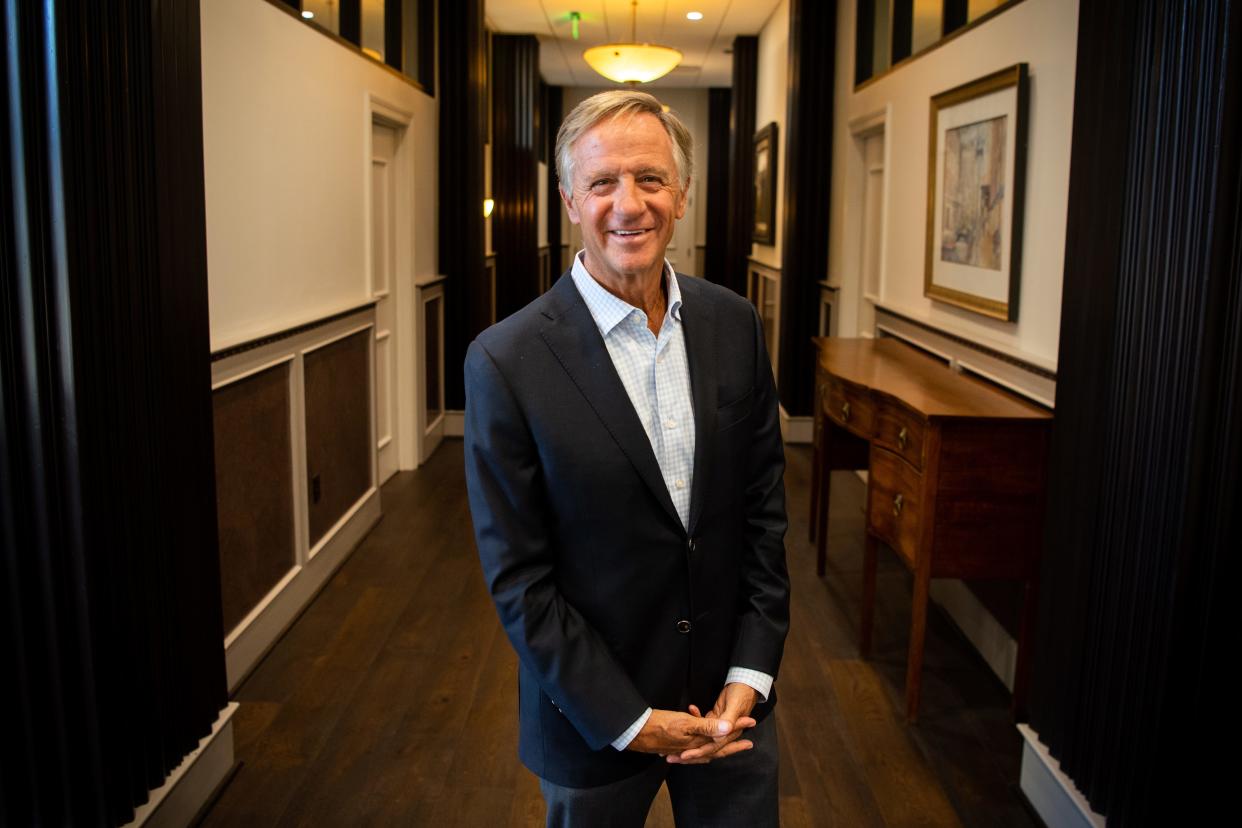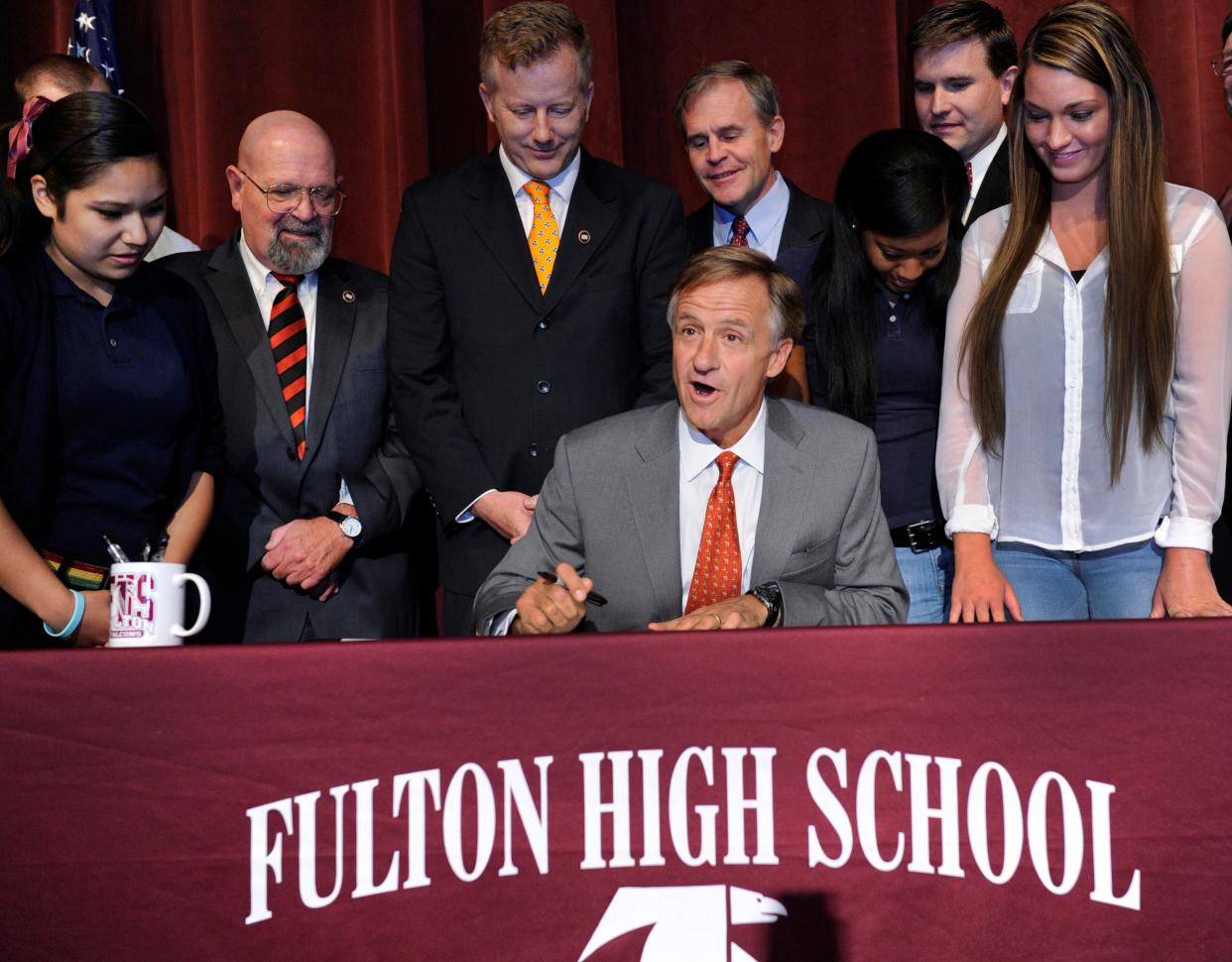Gov. Bill Haslam on civility, justice and mercy, and whether he has a home in today's GOP
Since leaving public life nearly five years ago, former Knoxville mayor and Tennessee Gov. Bill Haslam has rarely made news outside of his purchase of the Nashville Predators hockey team.
Haslam, 65, finds himself in a precarious spot. He is part of a dying breed in Tennessee: a political moderate, a rarity for both Republicans or Democrats though together they used to run the state. Today, he would say, both the left and the right don't have much room for compromise in the winner-take-all and win-at-all-costs political arena.
So he deliberately seeks out lanes where he can make a difference. He works with the University of Tennessee to promote political civility and joined the presidential campaign of U.S. Sen. Tim Scott, who unsuccessfully tried to shift the national conversation toward America's strengths instead of its division before dropping in November.
Haslam sat down with Knox News for a far-reaching interview tied to the 20-year anniversary of his election as Knoxville mayor. He took time to answer questions about civility and his 2021 book “Faithful Presence,” which dives into religion and calling and politics. Among other things, he touched on whether he has a home in today’s Republican party.
This conversation has been lightly edited for length and clarity.
Knox News: For decades, the state was led politically by East Tennesseans – yourself, Sen. Lamar Alexander, Sen. Bob Corker and going back to Sen. Howard Baker – and it’s now led by Middle Tennesseens. What does that mean for East Tennessee and is that good for the state? Does it matter?
Bill Haslam: I think you've seen this extraordinary growth in Middle Tennessee, Nashville and all the surrounding counties – I don't think that's going to change by the way. You’ve seen other places, Knoxville and Chattanooga, actually have reasonably good growth. It's not like we haven't had growth here. Memphis and Upper East Tennessee haven't grown as much as the rest of the state.
What's that mean? Listen, I don't think it means that nobody from East Tennessee can get elected to statewide office. I just don't believe that. I don't think most people today go and vote and say, ‘Well, they're from the same part of the state than I am. I'm gonna vote for them.’ I just don't think people think that way.

I think it's much more they're driven by much different things. I do think it matters, though, to make certain you have strong voices representing you in the legislature. I mean, it would be great for me if somebody from this part of the state got elected governor, but I think my point would be this: Don't underestimate the influence of electing the right kind of leaders who have influence beyond just their district in Nashville.
Knox News: Your conversations with former Democratic Gov. Phil Bredesen (in the podcast, “You Might be Right”) have largely focused on civil discourse. What do you want listeners totake away from these conversations?
Haslam: The whole idea was today, unfortunately, we think that whoever thinks something different than us is not just wrong, but often we think they're wrong with bad motives too. It is used to present a hard issue and to hear, ‘Hey, here's what somebody else thinks on this.’
So (in conversations) on banning assault rifles we brought in somebody who we thought could thoughtfully present, ‘Here's why I would not do that.’ And so, whether it's vouchers or immigration or whatever it is, to listen to the other side of the argument.
So, when it comes to the public square, it's all about critique. You bring an idea out and I say, ‘I love it’ or ‘I hate’ – it's usually one of those two. And if it's if ‘I hate it,’ then I'm gonna go criticize it and bombard the idea. We've lost this idea of maybe I should be curious to hear why does Tyler think that and is there something that I can learn or need to know behind that?
Everybody talks about polarization, but it’s not just that we're polarized, it's like everybody's convinced the other side is not just wrong, but they're wrong and they're the enemy and they have to be defeated.
Knox News: You have said before that you originally thought you’d be a minister. What changed your mind?

Haslam: I think it was this sense of I graduated college, came back here. Crissy and I got married a year later and we’d been real involved in our church and (it became) just the sense of, I actually don’t think that's what I'm called to do.
It certainly wasn't that I don't think that's a worthy use of somebody's life, because I think just the opposite, but I also feel like that's something that you need to feel like you really are called to do and after two or three years of thinking about it and praying about it, we decided that's not what I was called to do.
Knox News: What role should people of faith play in cultivating a less divided society?
Haslam: So when we look at the division of society today, and people ask who's to blame, actually, I say this as a Christian to ourselves, that we have to accept part of the blame.
I mean, Jesus says you're the salt of the earth. So that was meant in a time when salt was a preservative to keep the meat from going bad. So, if the meat goes bad, it's not the meat’s fault. It's the salt’s fault. And so, we start there. And I think part of that is we have to look at what are the places where we've let our politics affect our faith more than our faith affect our politics.
If you're in politics, the things that Jesus said are really inconvenient. That whole love your neighbor deal, it’s really hard if you think the other side is, like I said, not just wrong, but evilly motivated, that's hard. But again, if we're saying that's actually what we believe, then you have to walk in that way.
The example I use a lot with folks is in the book of James. He talks about wisdom that's from the earth and wisdom that is from above. And so, if you call yourself a believer, then you should be wanting the wisdom from above. And (James) says it's pure, peaceable, gentle, open to reason, full of mercy and good fruit (James 3:17). So, I always say to us as Christians in the public square, like how are we doing with our politics being pure peaceable, gentle, open to reason, full of mercy and good fruit? And I don't think most of us could grade ourselves very well.
The last GOP mayor?: 20 years later, Bill Haslam on his time leading Knoxville and whether he's the last GOP mayor
Knox News: You write, and it’s pretty clear, that you take the Sermon on the Mount (Matthew 5) quite literally and believe that Christians should be different. I’m curious what that means to you and what that looks like.
Haslam: I think it means are you going to let yourself be pulled along with the culture and the things that are definitely the opposite of what Jesus taught or are you going to say, no as hard as it is to try and love your neighbor in politics, I’m actually going to try to do that? And it’s really hard. I’ll be the first to say that.
As hard as it is to, in the middle of a political discussion where I think somebody is really wrong, to try and be pure, peaceable, gentle, open to reason, full of mercy and good fruits. As hard as it is to, in a world where animosity is the driving feature – the goal is to own the other side on social media – to say, ‘No, actually, I’m not going to try and own the other side. I’m actually going to try and love the other side and listen to them and see if there’s something I can learn.’ That’s hard.
Knox News: You write that Christians are called to be people who seek justice and proclaim truth. I’m wondering, as someone who has sat in the governor’s office and has a lot of sway, what does that look like? What does justice look like?
Haslam: It’s just a great question because I think one of the beauties of the Gospel that most folks don’t appreciate is this idea that there’s justice and mercy at the same time, right? And we all want justice until we need mercy for ourselves.
I think we should be people who bring to the public square this conversation of saying, ‘I know I’m a messed up person in so many ways who makes so many mistakes every day,’ so knowing that, I need to bring this sense of mercy that I want forme from my wife and my kids and the people I work with – that I need to bring that sense of mercy that I desire to the public square while we also know that justice is needed. We want the bad guys to get caught, you know. And you have to bring both of those things.
Knox News: You wrote that while you were in the governor’s office you waited until the end to decide on clemency decisions. As you’re weighing justice and mercy with literal death row cases and life in prison cases, how do you find justice?
Haslam: It’s really hard. Those are the ultimate examples of trying to do this. I’ll just say this, it was way harder than I thought. Even today, five years after I walked out of the governor’s office, if I walked back in it would still be hard.
The answer can’t be that I’m just going to grant mercy to everybody and we’re going to let everybody out of jail and we’re going to forgive every crime that’s happened. I don’t think anybody would tell you that’s a good plan.
On the other hand, you look for certain things. Has there been true change with those folks? Is society better with that person out of prison than is with them in? Have they served an appropriate amount of time?
There was a whole list of things we used to evaluate, but I want to say again, it’s really hard and I hope we got it right.

Knox News: You write that the American experiment faces its greatest challenge since the Civil War. What do you mean by that and how do we as a society meet that challenge?
Haslam: We’re an evenly split country. The last eight presidential elections have been really close. The U.S. Senate has been within one or two votes. The U.S. House has only a five or six vote difference and that could easily flip back next time. But we don’t tend to live in ways that remind us that we’re evenly split because we all live and work and worship and our kids go to school with people who think mostly like us … so we think, ‘I’m representing the people here. Everybody thinks like I do.’ But they don’t, or we wouldn’t be getting these splits.
So, you take that 50/50 split and you add the weaponization that you’re allowed through social media, and everything is exasperated in such a way that all the battles feel much more real. So, if I don’t really know anybody that thinks differently than I do on gun control or abortion or immigration or any other hot button issue – if everybody I know thinks like I do then the only reason it’s not getting acted upon is these idiots in the legislature or the U.S. Congress or however I want to see them. It’s that they’re not seeing it the way that people are wanting them to see it.
That feeling of righteousness that everybody thinks like I do it’s just our leaders can’t get it right … roughly 33% of Americans – Republicans and Democrats – think that violence against people on the other side is justifiable … that’s scary.
Knox News: You write, to solve a problem you have to (a) know that your answer may not be the best one and (b) you have to want to hear the other side. As you say, we don’t do that. How can we get better?
Haslam: Again, as a person of faith I always say, make sure to always start with yourself. But I also hope that through conversations a little of what we’re trying to do with the podcast is to make some small change …
I’ll also say this, I am convinced that the loudest voices get an incredible megaphone because of social media. There’s a big chunk of the country that really is not there. And when I go to speak with groups – to a Rotary Club or some community group somewhere – that’s not where most people are. It’s just where people who are the loudest in the argument are.
And here’s my fear, that most of those people are just going to give up on the process. They’re just going to say, ‘I’m over it. I’m frustrated.’ I can’t tell you how many people tell me, ‘I’m just going to quit voting in primaries because the people in my party’ – by the way, I hear this from both sides – ‘don’t think the way I do any more.’ I can’t tell you 100% what the right answer is, but that’s not it because the cake is baked by the time the primaries are over.
Knox News: Tennessee had been known for compromise in the legislature and in Congress, electing moderate Republicans and Democrats because that was the only way you could get elected. What happened?
Haslam: I think the big change happened when Tennessee’s rural areas became Republican, when you think of all of West Tennessee, which had historically been conservative Democrat. I’d argue that for a lot of social reasons, people in that area said, ‘Well, the Democratic Party doesn’t represent me anymore’ and those folks moved into the Republican Party.
And then I think two things happened. Tennessee became this overwhelmingly Republican state, number one. And number two, as a guy from West Tennessee told me when I was running (for governor), ‘Your dad was a Republican, wasn’t he? Mine wasn’t.’ He said, ‘I’m a convert in the church (“church” being the Republican Party), and my passions run a lot hotter than yours do.’ I think his point was to say people who have been converted into the political ‘faith’ tend to bring more zeal than folks who grew up in the faith.
So, you combine that passion with all of a sudden the state is much more Republican and it no longer became necessary to win two elections. You just had to win the primary and then the general was done.
I think the challenge for Tennessee going forward will be can we continue to elect people who will make an outsized difference in the state and the country when you only have to win one election.
Knox News: The new Speaker of the House, Mike Johnson, did not vote to certify the 2020 election. Do you, Bill Haslam, have a home in today’s Republican Party?
Haslam: Well, yeah. I think I do. Good political parties grow and have lasting impact and have room for a lot of people with different views. The Republican Party, you can’t help but recognize, is tremendously different than it was. This is not the party of Ronald Reagan and is definitely not the party of George Bush.
Anytime you go through that kind of transformation you’re waiting to see what it’s going to grow up to be and I think there’s still something to be determined there.
Knox News: Do you consider yourself a Never Trumper?
Haslam: I mean, it’s no secret that since President Trump ran in 2016 that I didn’t think he should be our nominee. I have some serious issues, particularly with Jan. 6 and contesting the election. Listen, we have always been the nation you could point to and say … Even when people didn’t win, whether it was Richard Nixon who had an incredibly close election with Kennedy to Al Gore and George W. Bush, at the end people have said, ‘While I don’t think the democratic process was perfect, I still trust the result and I love this country so much to make certain that we have a transition of power that’s orderly and respected.’
So, when that doesn’t happen, we all have to recognize our democracy is a lot more fragile than we’d like to admit.
Knox News: What do you miss about public office?
Haslam: That’s easy. I miss the leverage you have for change in public office.
I use the example of Tennessee Promise. Obviously, I come from a family with assets, etc., but I don’t care who you are, you can’t go promise to the state that your brand-new child that’s just been born, that we’re going to give them two years free of community college 18 years from now. You just can’t have that kind of impact.

So, you can go look and say, ‘Wow, we need to dramatically increase the percentage of Tennesseans with a degree or certificate, what if we had it free? Let’s go put that program in place.’ Again, I don’t care who you are, you can’t really do that as a private citizen.
Knox News: What would it take for you to run again?
Haslam: Again I (laughs) … I don’t want to sound too corny, but it’s really a couple of things. One, the sense of, ‘That’s what I’m called to do.’ I thought about running for the U.S. Senate twice. Had two great opportunities, but it just never felt like that was the right thing for me.
And so the call, and then a clear sense that I can make a difference in that role right now.
And then three, by the way, you have to think that you have at least a path to win.
Knox News: And those things are not aligning?
Haslam: Yeah. Again, I’ve thought about two or three things but never felt like (a) I was called or (b) I had a real sense for how I could make a difference or (c) by the way, I feel like I have a chance to win, too.
Knox News: As the “education governor,” which is what people have called you, what is your view on certain Republican members of the Legislature considering rejecting federal funding for education?
Haslam: I think it is a really bad idea. And also, by the way, I think it’s a nonstarter. I think it’s one of those things that some people threw out as an idea, but I will be surprised if it gets any serious, substantive conversation and legs in the next legislature.
Knox News: Why is it a bad idea?
Haslam: Well, if you look at where that money goes to, a lot of it goes to special education. I don’t think anybody would say we need to spend less money on that. Regardless of where you’re at on the political spectrum, I think most people would say (no).
Here’s another thing I worry about. We’ve been through a pretty unprecedented season of growth in Tennessee. So, you had the recession in 2008, less so in 2009 and still around a little bit when we went into office in 2010-11. The state has had remarkable growth really for the last 12-13 years. So, you haven’t had hard budget situations. Those days will come again. And my fear is when you don’t use those muscles you forget how they work. So, there will come a time when we’ll have to make really hard budget decisions.
I can remember my first year we came in and while we were starting to come out of the recession you had all of this fiscal stimulus (in 2008-09) where all this federal money went into state governments, not unlike what happened during COVID. But that money was all running out the year we came in, so we were going to have to make some cuts. Well, going through and deciding that we’re going to make this cut in the Department of Intellectual and Developmental Disabilities is not fun. It’s really hard, but we had to make the budget balance.
So, we cut a lot of money out our first two years, a lot, and it was painful and hard, but we had to get there. If you haven’t had to make those decisions, then it feels easier to say that maybe we don’t need that federal money. Well, hold on a minute. So, you’re going to be replacing it with state money and then what are you going to do? What are you going to cut if revenues go from growing 7-8% to growing a more natural 2-3%?
Knox News: Last one. Recently U.S. Rep. Tim Burchett voted to remove former Speaker of the House Kevin McCarthy. I’m curious what you think of his decision.
Haslam: Yeah, I’m probably not going to comment directly on that. I will say this. Politics, like most other things, at the end of the day is a team sport. Listen, there are things that I did when I was in office that weren’t 100% what I wanted to do or the way I wanted to do them. So, you have to decide are you going to stand on principle, which you do. But also, am I going to stand in such a way that the other folks on my team are never going to pass me the ball?
It’s a balancing act. So, you don’t ever sacrifice your principles on what you think is the right thing to do, but you realize it’s a long game and I’m not playing it by myself.
Tyler Whetstone is an investigative reporter focused on accountability journalism. Connect with Tyler by emailing him at tyler.whetstone@knoxnews.com. Follow him on X, formerly known as Twitter, @tyler_whetstone.
Support strong local journalism by subscribing at knoxnews.com/subscribe.
This article originally appeared on Knoxville News Sentinel: Former Tennessee Gov. Bill Haslam on civility, justice and today's GOP
